Former Israeli Official Warns That Judicial Changes Undercut Fight Against Iran

The former chief of Israel's Atomic Energy Commission has warned Benjamin Netanyahu that his judicial changes will weaken Israel's position in confronting Iran.

The former chief of Israel's Atomic Energy Commission has warned Benjamin Netanyahu that his judicial changes will weaken Israel's position in confronting Iran.
According to the Ynet news, Zeev Snir, a Netanyahu appointee who led the atomic commission from 2015-2022, sent a letter to the Prime Minister on Sunday, expressing his concerns.
Benjamin Netanyahu has started his sixth term as prime minister by forming a coalition of right-wing religious extremists who intend to change the country's judicial rules.
Opponents of the government, who believe that the process will lead their country to a religious dictatorship, call the changes in the judiciary a "government coup" and warn against the "collapse" of democratic foundations in Israel.
In his letter, Snir said focusing on advancing the far-reaching changes to the judiciary would undercut Netanyahu’s ability to obtain the key aims he laid out, particularly in terms of countering Iran.
“Strategic competition with Iran requires enlisting all of the State of Israel’s resources and cultivating its power militarily, economically, diplomatically and socially. Iran is strengthening its position and capabilities in terms of its nuclear [program], ties with Russia and China, dealing with sanctions, and more,” he said. “All this as the West, led by the US, is busy with competing with China, the war in Europe, the fight with Russia and the energy crisis.”
Before Snir, a number of former senior officials, who were appointees of Benjamin Netanyahu, have warned about the security, economic and diplomatic consequences of judicial changes.
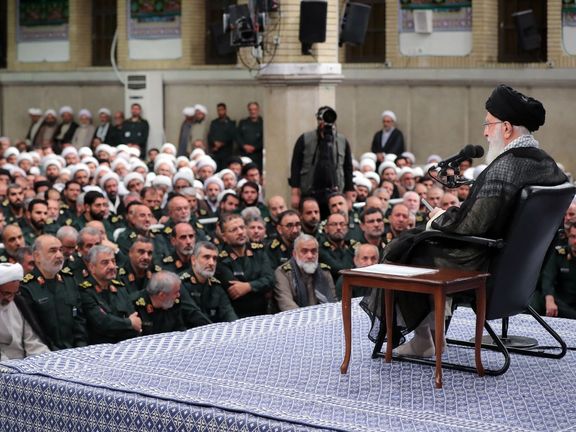
Members of IRGC’s Quds Force are weary of the fight with Israeli forces at Golan Heights and are selling military intel to Israel, a recently-leaked document shows.
Minutes of a meeting of senior clerics and Revolutionary Guard commanders with Supreme Leader Ali Khamenei, leaked to media last week, suggest that the economic and political situation in Iran has made the Islamic Republic’s forces sell information about Quds Force operations to Israel, and that more and more elements are seeking to leave the battlefield in Syria and get jobs and positions inside the country.
The 44-page document contains citations of remarks by 45 IRGC commanders and clerics at a meeting at Khamenei’s office on January 3 on the anniversary of the death of Quds Force commander, Qassem Soleimani, who was killed by the US three years ago.
Almost all the participants spoke about the current wave of antiregime protests that has engulfed the country since September last year. The meeting, held more than three months into the protests, focused on the negative impact of the protests on the morale of forces under the command of the IRGC and their burn-out, with several offering anecdotal accounts of insubordination.
The document indicates that officials are shocked by the large scale and duration of the protests and admit that they do not have the means to quell the uprising. The participants also acknowledged massive defections and desertions among the military forces and clerics, mainly due to the unrelenting economic woes as well as in protest to the heavy-handed crackdown by security forces and harsh sentences by the judiciary.
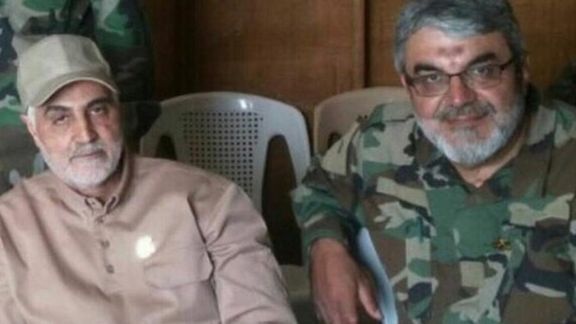
Rahim No’i Aghdam, who served as the commander of IRGC’s Zeynab operational headquarters in Syria, said during the meeting that the Quds Force "faces many problems" in the border areas of Israel and the Golan Heights. He mentioned Israel's "non-stop" bombings and "inability of quick access to the supplies of Iran's allied forces in this region" as some of the problems, adding that economic hardships and the ongoing protests have also led to "ideological issues and family problems" among the ranks of the forces.
He said that "leaks of operational plans” has reduced the edge of Iranian forces against Israelis, adding that "pre-emptive attacks by Israeli forces in five operations showed us that the issue of infiltration... and the forces’ unwillingness to remain at Israel's borders” have made them do “unimaginable” things, such as selling military intel.
No’i Aghdam added that if the Islamic Republic loses the areas that it has gained "with years of effort" outside its borders, "a practical threat to the Islamic Republic regime will not be unimaginable."
Other attendees also talked about the desertions and disobedience within their forces, with Abdollah Haji-Sadeghi, Khamenei’s representative in the IRGC, saying that “there is no doubt about desertions.” He said that different security organizations of the country have reported varying figures, from 12 percent to 68 percent of desertions.
Khodarahm Sarani, the IRGC’s commander in the city of Zahedan -- the provincial capital of Sistan-Baluchestan province that is home to Iran's Sunni Baluch minority of up to two million – said the demands of the people there are basic such as water and basic necessities. He added that remarks by their Sunni leader Mowlavi Abdolahamid have united the residents, making them leave aside their sectarian differences and focus on popular demands.
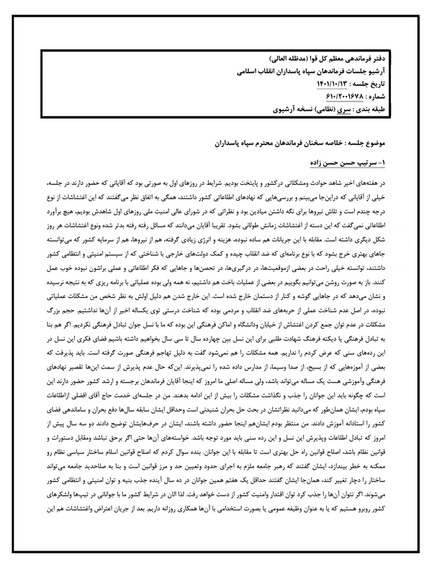
Sarani then made a direct attack on the secretary of Iran’s security council Ali Shamkhani who was present at the meeting. “When an officer under my command comes to my office and shows the watch worn by Mr. Shamkhani's son and tells me that the price of this watch is equal to four years of my service in the armed forces, how can I answer?”
“We cannot always blame the problems on the enemy, yes, we are under sanctions, but the country's income is not low. If there are problems in the country, then how come these problems do not show themselves at the level of military commanders,” he added.
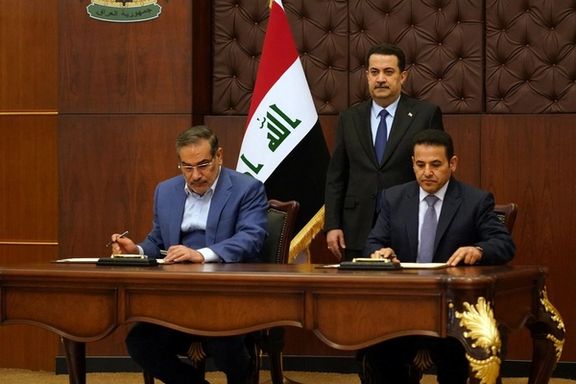
It has been a busy few days for Iran’s national security chief as he flies round the region trying to mend ties with Arab neighbors.
Instead of the country’s foreign minister, Hossein-Amir Abdollahian, it is Ali Shamkhani who has become the diplomatic face of the regime on visits spanning some of the key regional countries.
Since Shamkhani signed an agreement with Saudi Arabia in Beijing on March 10 to restore ties with Riyadh, he has embarked on regional trips to improve strained relations with Arab neighbors. A visit to the UAE and then Iraq were part of the effort to continue the momentum.
Bolstering economic ties is of course the underlying goal but it is an important message that it should be an official trusted by Iran's ruler Ali Khamenei who is the messenger on this important diplomatic tour de force.
During his Sunday meetings in Iraq, agreements were reached for the repayment of Iraqi debts by imports of goods, Shamkhani claimed. He tried to be the bearer of good news for the Iranian people as the country struggles to even get hold of basic food items amidst this great sanction-burdened economic crisis.
Shamkhani told the official government news agency IRNA Monday that his one-day trip was “productive”, hot on the heels of his visit to the United Arab Emirates a few days earlier.
Iraq owes well-over $10 billion to Iran – by some estimates almost $20 billion – for imports and natural gas and electricity. However, due to US banking sanctions on Iran, Iraq cannot pay cash dollars to Tehran.
A mechanism exists for sending essential goods, such as food and medicine in exchange for the Iraqi debt. Shamkhani said that he and the delegation accompanying him held talks with Iraqi officials to facilitate this mechanism, but he was careful in his wording not to hint at any cash transfers.
Shamkhani told IRNA: “Another step was to determine mechanisms for using resources related to Iran’s financial receivables from Iraq to purchase essential goods and to resolve currency issues related to [bilateral] trade.”
Iranian officials said that Shamkhani has also agreed on a deal with the UAE on using dirhams for bilateral transactions, although the UAE has not confirmed any such agreements. It too, must watch its step as it remains on the Financial Act Task Force gray list, which it will not want to worsen by anything less than above board in its business ties to Iran.
Over the weekend, officials in Tehran even claimed that after the deal they injected hundreds of millions of UAE dirhams into the local forex market to support the battered Iranian rial. Contrary to the claim, the rial fell on Sunday and was trading at 490,000 to the US dollar on Monday, down from 460,000 on Friday.
Iraq may yet be more of a diplomatic ally than a financial one. Since the US invasion in 2003, Iraq’s foreign currency reserves have been held by the US Federal Reserve, giving Washington significant control over Iraq’s dollar transfers.
The Central Bank of Iraq requests dollars from the Fed and then sells them to commercial banks and exchange houses at the official exchange rate through a mechanism known as the “dollar auction.”
Reports earlier this year indicated that the United States restricted dollar transfers to Iraq because of suspicions of Iranian money laundering and dollar transfers to Tehran.
These restrictions even led to a dollar scarcity on the local market in Iraq and the fall of the Iraqi dinar. Subsequently, Baghdad sent a high-level delegation to Washington in February to resolve the issue and they discussed banking and money laundering issues related to Iran.
In its desperation amid a serious financial crunch due to continuing US sanctions, the Islamic Republic hopes that better ties with Persian Gulf Arab countries can help reduce the pressure. But these countries are well aware of US sanctions and it is not clear how far they would go in accommodating the Iranian regime’s needs for an economic lifeline.
The financial pressure is also needed to convince Tehran to abide by promises it apparently made to Saudi Arabia. Chief among them is ending its military support for Yemen’s Houthis who have been fighting a Saudi coalition for eight years. This, remains to be seen.
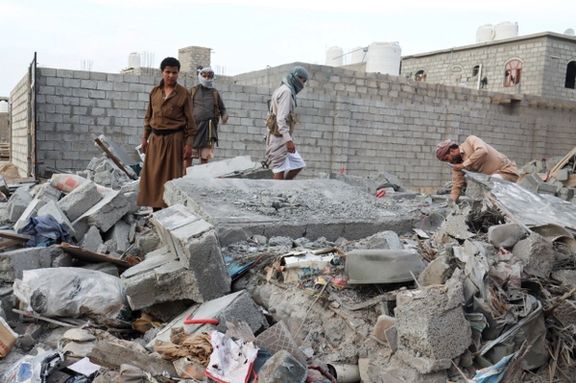
The two sides in Yemen's conflict Monday said Monday they had agreed to exchange some 880 detainees after talks in Switzerland facilitated by the UN and the International Committee of the Red Cross.
The head of the Yemeni government delegation told Reuters around 880 detainees would be exchanged.
The development comes after a deal between Iran adn Saudi Arabia March 10 to restore diplomatic ties.
Yemen's Iran-aligned Houthi group said it would release 181 detainees, including 15 Saudi and three Sudanese, in exchange for 706 prisoners from the government, according to statements on Twitter by the head of the Houthis' prisoner affairs committee Abdul Qader al-Murtada and the group's chief negotiator Mohammed Abdulsalam.
The UN and ICRC did not immediately confirm that a deal had been reached.
There is hope that a deal could facilitate broader efforts to end the conflict, which have been helped by the resumption of ties between Iran and Saudi Arabia this month.
UN special envoy Hans Grundberg told the UN Security Council last week that there were intense diplomatic efforts at different levels to end the fighting.
The exchange of around 15,000 conflict-related detainees has been under discussion as a key confidence-building measure under a December 2018 UN-mediated deal known as the Stockholm Agreement.
But progress has been slow. A few exchanges, including in 2022 and 2020, have been coordinated by the ICRC, alongside smaller deals directly between the warring parties.
The conflict in Yemen has widely been seen as a proxy war between Saudi Arabia and Iran. A Saudi-led coalition intervened in Yemen in 2015 after the Houthis ousted the government from the capital Sanaa in 2014.
A UN-brokered truce last April has largely held, despite expiring in October without the parties agreeing to extend it.
Reporting by Reuters
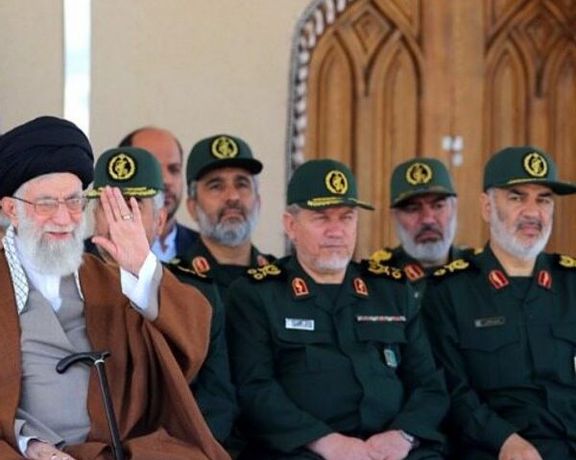
Top officials had serious concerns about loss of loyalty among the ranks of the Revolutionary Guards (IRGC) amid the recent protests, a new document reveals.
Iran International has received a copy of a 44-page document that contains citations of the remarks made by 45 IRGC commanders and clerics at a meeting with Supreme Leader Ali Khamenei at his office on January 3 on the anniversary of the death of IRGC’s extraterritorial Quds Force commander, Qassem Soleimani.
The document ends with an excerpt of Khamenei’s own remarks complaining that those present had spoken about loss of faith and the hardships that the rank and file endure, but no one had talked about those who had kept their faith in the regime despite hardships.
The meeting was held more than three months into the anti-regime protests following the death of the 22-year-old Mahsa Amini in the custody of ‘morality police’ and quickly spread across the country.
Participants in the meeting included top IRGC officers such as Major General Gholam-Ali Rashid, commander of IRGC’s Khatam Al-Anbiya Central Headquarters, Secretary of the Supreme National Security Council Admiral Ali Shamkhani, Hojjat ol-Eslam Mahmoud Mohammadi-Shahroudi who heads the Basij Militia Organization of Seminary Students and Clerics and Hojjat ol-Eslam Abdollah Haji-Sadeghi, Khamenei’s representative in the IRGC.
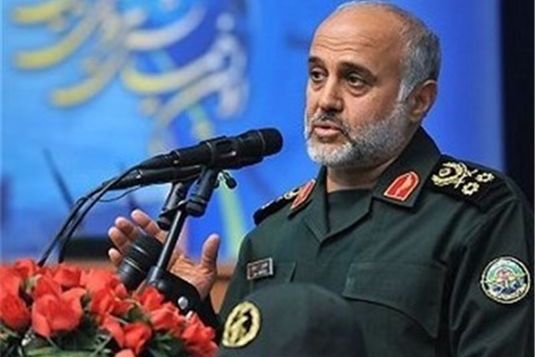
Rashid told Khamenei that there had been several cases of major insubordination since the protests started including aborted plans to use artillery to shell certain targets in Tehran, including Khamenei’s residence. Culprits were arrested, he said.
Speakers mainly focused on the negative impact of the protests on the morale of forces under the command of the IRGC, with several offering anecdotal accounts of insubordination. They also mentioned personnel’s refusal to use violence against protesters, particularly women and also cases of desertion. According to one commander, forces had even helped the protesters in some cases by providing misleading information to operational forces and sending them to wrong locations.
Some of the speakers also said the rank and file were paid low salaries which in many cases made them identify themselves with the discontented public and sympathize with them. Some like Major General Rashid suggested that taking action to improve the living standards of the personnel was required given rising cost of living that affected them and their loyalty to the regime.
Iran has been experiencing 40-50-percent annual inflation for the past three years, with food items rising 70-110 percent in one year. Crippling US sanctions are the major reason behind the economic crisis.
In one case, Colonel Ehsan Khorshidi, the coordinating deputy of the IRGC in Alborz Province said that a few conscripts and a lieutenant stole military’s food supplies which were then distributed in the poverty-stricken neighborhoods of Karaj, the capital of the province. “Feeling sympathy with the people is not a small matter. This time it was the food supplies of the division. What if next time it is the weapons they distribute?” he asked.
He also pointed out that many among the families of the forces had been involved in the protests and had even been arrested. “This morning at least six senior officers contacted me to ask me to request my help to get backing from the commander of the force in the matter of the arrest of their family members.”
According to the document, Khamenei said the judiciary chief should order leniency in the cases of arrested IRGC staff’s family members.
Several of the speakers pointed out that the continuation of the protest for months and their spread across the country had been beyond their expectations. Given past experiences, Colonel Khorshidi said, officials thought the protests would be quelled even before reaching the level they could be considered as a “threat”.
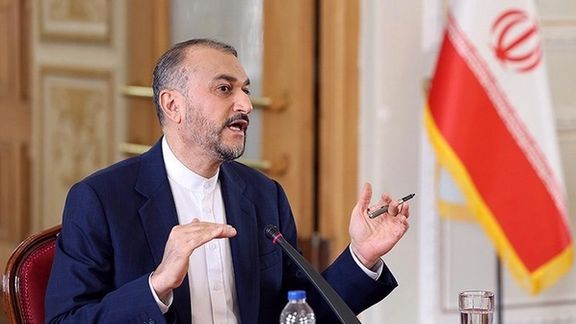
The Islamic Republic insists it has reached a deal with the US on a prisoner swap, a development that Washington has been denying but Tehran is getting more vocal about it.
Iranian Foreign Minister Hossein Amir-Abdollahian repeated on Sunday that the two countries have agreed on such a deal but it is not clear if the claim is true or it is a stunt by the regime. The new snippet of information that was divulged to the media in Amir-Abdollahian’s remarks was that the US and Iran had agreed on the deal March last year and they are tweaking the details through an unnamed third party in recent weeks.
“We have signed a document in March last year through a representative introduced by the United States from a third country. We consider the issue of prisoner exchange to be a completely human issue. In recent weeks, there have been indirect discussions to update that document regarding the exchange of prisoners," he said.
The minister added that the basis of any new agreement is the minutes of the meeting that were signed in March last year. “Our opinion is that the American side should pay attention to the human aspects of this issue above all, this is something that is strongly emphasized by us,” he said.
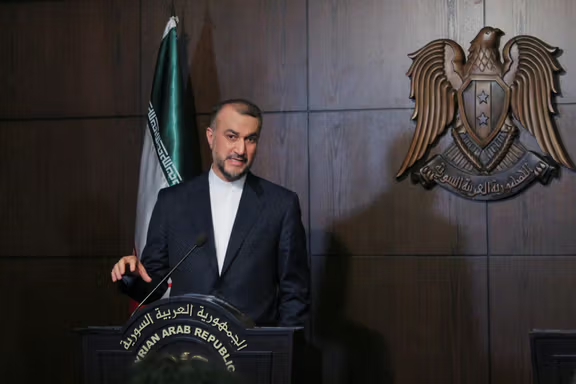
If true, a deal one year ago might have been within the context of a nuclear agreement that never materialized and probably hinged on a US agreeing to free Iran’s frozen funds. It has long been reported that South Korea would free about $7 billion held in escrow by its banks due to US sanctions.
The United States has categorically denied the existence of such a deal, but it can simply be the Biden administration’s tactic not to build up the hopes of the involved families or to avoid international outcry over its covert appeasement of a regime that is condemned by the international community over its gross human rights violation during recent protests and its military assistance to Russia.
Washington has repeatedly expressed concern about the fate of its citizens imprisoned in Iran but also has rejected the existence of such a deal, that can be construed as a failure to stand up against the Islamic Republic’s policy of hostage taking, a practice that started in the early days after the establishment of the regime and has been often used ever since.
In November 1979, a group of leftist students backed by the new revolutionary government occupied the US embassy in Tehran and took 54 Americans hostage for 444 days. Iran never condemned the act that ruptured bilateral relations. Tehran denies any policy of hostage taking and insists all foreigners are tried legally. However, it has frequently shown readiness for prisoner exchanges and participated in swaps in the past.
UN experts and international human rights organizations say that the Islamic Republic takes foreigners hostage to extract concessions from the West.
Currently, the regime is in the midst of negotiations to bring home one of its former diplomats, who is serving a life sentence in Belgium for his involvement in a plot to bomb a gathering of an exiled dissident group. Belgium's Constitutional Court said in a press release earlier in the month refused to annul a treaty with Iran that could lead to the diplomat, Assadollah Assadi, convicted of terrorism, to be swapped for Belgian aid worker Olivier Vandecasteele, held hostage in Iran.
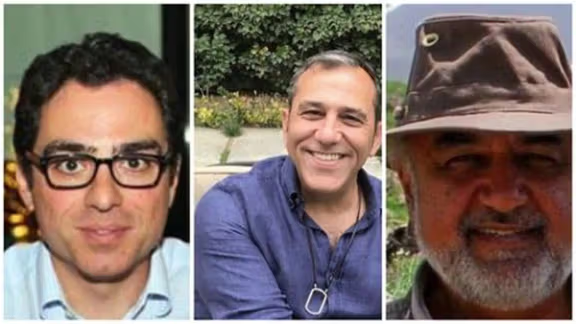
Since early March, Iran insists it is doing a prisoner swap with the US in spite of the Biden administration’s categorical denials. The Iranian foreign ministry says the "written agreement has been signed by the official representative of the United States” though has not named the official.
White House denies such claims, calling it “a cruel lie”, but reiterates that the United States is committed to securing the release of Americans held in Iran.
Three Iranian-American citizens, Siamak Namazi, Emad Sharqi, and Morad Tahbaz, are still imprisoned in Iran. In exchange for the release of the hostages, in addition to demanding money, the Islamic Republic plans to urge Washington to release the Iranians imprisoned in the US for circumventing sanctions or involvement in terror activities.